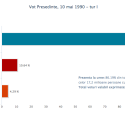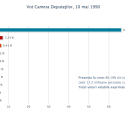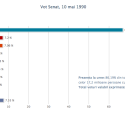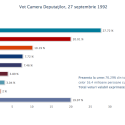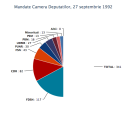IMPORTANT DEVELOPMENTS
- Foreign policy. Prime Minister Victor Ponta makes an official visit to Spain.
- Economy. Romania ranks fourth among EU countries according to size of government debt.
- Privatizations. The CSAT must decide on the privatization of the CFR MARFA Company.
- European funds. The USL Government adopts new initiatives in order to increase EU funds absorption.
- Politics. Victor Ponta expresses his commitment to observe the cohabitation agreement signed with president Traian Basescu.
- Polls. Government’s trust ratings are on the rise.
1. Victor Ponta visits spain
Prime Minister Victor Ponta met in Madrid with King Juan Carlos I of Spain and with the President of the Council of Ministers, Mariano Rajoy. The Prime Minister, declared he plans to change the image of Romania in front of the European partners. The chief of the Executive stressed that the King of Spain appreciates the Romanian community.
“I want to rebrand Romania in front of the European partners, I want to present Romania the way we are, not to say that we are more beautiful”, explained Victor Ponta. The PM noted that there was a 14% increase of trade relations between Romania and Spain at the beginning of the year. “I assured Prime Minister Rajoy about the fact that all major projects in which Spanish companies operating in Romania are projects upon which the Government I lead directs its full attention”, added Victor Ponta.
The Prime Minister assured that there is no risk that a large number of Romanian citizens to leave the country after January 1, 2014, once the labor market restrictions are fully lifted. “January 1 will be the moment when not only Spain and the UK, but also other countries will lift last restrictions. I do not believe in the importance of January 1, because, according to all the independent studies we have done, currently there is not such a significant number of Romanian citizens who want to go to work abroad, nor will there be a significant increase in the UK or in Spain or elswhere”, added Victor Ponta. In turn, the Spanish Prime Minister noted that Spain and Romania are strategic partners, and that bilateral relations will be intensified, also, in the future.
“Spain and Romania are strategic partners, we will intensify our bilateral contacts, including meetings at the highest level, with different ministers. We also take into account the great Romanian community, people who live in Spain and form the largest community of foreign residents. The Spanish society is welcoming and grateful for all those who come and work here and contribute to overcoming the crisis”, said Rajoy.
During the meeting with the President of the Madrid Community, Ignacio Gonzalez Gonzales, the PM spoke about a special bond between Romania and Spain, pointing out that “a strong Romanian community can only be an extra element to this special relationship”.
2. Eurostat places Romania fourth in the EU according to Government debt
Romania is placed on fourth place in a ranking of the least Government indebted EU countries. According to data announced by Eurostat, the Government debt of EU countries increased by 101.5 billion euros in the first quarter, in comparison to the end of last year, at approximately 11.112 billion euros, from 85.2% to 85.9% of GDP.
The highest levels of indebtedness for the end of the first quarter of this year were recorded in Greece (160,5% of the GDP), Italy (130,3%), Portugal (127,2%) and Ireland (125,1%). The lowest debt in relation with the GDP was recorded in Estonia (10% of the GDP), Bulgaria (18%), Luxembourg (22,4%) and Romania (38,6%).
The information provided by the Eurostat is a new argument for the stability of Romania. These complement the statistics indicating Romania as one of the EU countries with the highest growth and the highest increase in the number of stable working places.
3. The CSAT must decide on the privatization of the CFR company
The Supreme Council for the Defense of the Country (hereinafter CSAT) must decide on the outcome of the negotiations regarding CFR MarfaIf CSAT does not approve the privatization of CFR Marfa, it will not be done, and the Government is considering the solution of private management, restructuring the company and trying to bring it where it was in 2008, back on plus, before it was hijacked by the PDL.
The Government’s decision is consistent with the procedure approved by CSAT regarding the privatization strategy of CFR Marfa. If CSAT ruled about this privatization before its unfolding, it must also decide on the outcome of the negotiation. Also, if CSAT approved 3 privatizations so far, and now it will deny it, it means that, up to this point, it has acted illegally. CFR Marfa is a strategic company and is subject to the duties of CSAT.
The strategic importance of rail freight in Romania comes from both the obligations of CFR Marfa to meet the defense need of the country, and from the transport services it offers to some sectors of major importance for the country’s economy. Hence, the Government awaits a decision during the first meeting of the CSAT.
The politicking polemics and statements of the Presidential Administration are contrary to the public interest and the proper functioning of state institutions. Regarding the privatization of CFR Marfa, if compared to other EU countries in the region, we see that the situation in Romania is not as disadvantageous as presented in the media
In the case of CFR Marfa, besides the 202 million euros paid on the 51% stake, GFR will have to cover also CFR Marfa’s debts to private entities, estimated at tens of millions of euros, which is a better deal obtained by the government, compared with the similar privatizations from Poland, Bulgaria and Croatia.
Market uncertainties, the rich offer of railway companies for sale, their generalized losses and historical debts make prices to be low and buying a rail freight operation to be almost a bargain, an investment which can be recovered in just 5-7 years by a strong investor, not only in Romania, but also throughout Eastern Europe.
4. The USL plans to increase the absorption of EU funds
USL project to increase the absorption of European funds – private beneficiaries of EU funds are not required to conduct public procurement procedures anymore
It is another initiative of the USL Government aiming at accelerating the absorption of EU funds and helping private beneficiaries to implement their projects faster. This decision resulted from the dialogue between the Government and private beneficiaries, who were unhappy about being obliged to undergo public procurement procedures, without being familiar with these bureaucratic procedures.
The project is still subject to public debate on the Ministry of EU Funds website. The requirements so far were greatly hindering or even led to blockages of private beneficiaries’ projects. Obviously, there will be maximum thresholds for these procurements without public procedure, so there are no abuses from the beneficiaries.
Given that private beneficiaries co-finance these projects, they are the first interested in the efficient and fair use of their money. The new procedures will be available for all seven operational programs. In just one year, USL managed to triple the level of absorption of EU funds, we unlocked operational programs blocked by the irregularities of PDL and we continue to take good decisions, designed to accelerate the absorption of EU funds.
5. Prime minister Victor Ponta vows to continue cohabitation with incumbent president Traian Basescu
Prime Minister Victor Ponta declared that he will continue to maintain the institutional collaboration agreement, signed with President Traian Basescu, adding, however, that the latter has not complied with the agreement, being neither the first nor the last time when Traian Basescu did not keep his word.
“For my part, that institutional collaboration agreement, I am very determined to respect my obligations. From the President’s point of view, it is very clear that he is not, he did not respect it anymore and, well, it would be neither the first nor the last time when he is not keeping his word”, said Victor Ponta.
Victor Ponta specified that he plans to comply thenceforth with the agreement, because he believes that Romania needs political stability for economic growth. Instead, the PM will continue to ignore and disregard certain reactions of President Traian Basescu, showing that the elations caused by the loss of power are his concern alone. “An institutional collaboration between the Government and the Presidency should be based on public interest, not on private, demagogical interests, generated by launching a party”, said the PM.
The Prime Minister also said that, last year, the President made demagogical statements of the kind launched earlier this week, but which have been sanctioned by the population through the December vote.
6. The USL Cabinet’s trust ratings increase
Romanians’ confidence in the USL Government is up since last fall, before the Parliamentary elections, and two times higher than the level of trust in the Government in 2011.
Thus, if last fall, according to the Eurobarometer, the level of confidence in the USL Government led by Victor Ponta was 20% (November 2012), this spring (May 2013) reached 26%, similar to the level of trust the USL Executive benefited from in the same period of 2012 (27%).
Compared to previous years, the Eurobarometer data shows the level of confidence in the USL Government doubled up against the PDL Governments – the Boc Government received a 13% confidence rate in May 2011. The almost 30% figure of the entire population equates to approximately 60% of the voters, which is a good score for the ruling coalition.
Data for Romania about the public opinion in the EU, included in the Eurobarometer – spring 2013, were collected by TNS CSOP, on a sample of 1,083 respondents, May 11-21.



